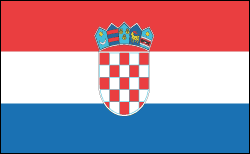Croatia History


History
Croatia, at one time the Roman province of Pannonia, was settled in the 7th century by the Croats. They converted to Christianity between the 7th and 9th centuries and adopted the Roman alphabet under the suzerainty of Charlemagne. In 925, the Croats defeated Byzantine and Frankish invaders and established their own independent kingdom, which reached its peak during the 11th century.
A civil war ensued in 1089, which later led to the country being conquered by the Hungarians in 1091. The signing of the Pacta Conventa by Croatian tribal chiefs and the Hungarian king in 1102 united the two nations politically under the Hungarian monarch, but Croatia retained its autonomy.
Following the defeat of the Hungarians by the Turks at the battle of Mohács in 1526, Croatia (along with Hungary) elected Austrian archduke Ferdinand of Hapsburg as their king.
In 1667, the Dubrovnik region was devastated by an earthquake, destroying the city and causing the deaths of around 4,000 people. Around three-quarters of all buildings are destroyed with reports of large cracks appearing across the land and thick clouds of dust.
The incident had long-term implications for the region with the Republic of Ragusa never managing to recover its role as a prominent trading hub with the republic ending in 1808.
After the establishment of the Austro-Hungarian kingdom in 1867, Croatia became part of Hungary until the collapse of Austria-Hungary in 1918 following its defeat in World War I. On Oct. 29, 1918, Croatia proclaimed its independence and joined in union with Montenegro, Serbia, and Slovenia to form the Kingdom of Serbs, Croats, and Slovenes. The name was changed to Yugoslavia in 1929.
World War II: Nazi Occupation and Puppet State
When Germany invaded Yugoslavia in 1941, Croatia became a Nazi puppet state. Croatian Fascists, the Ustachi, slaughtered countless Serbs and Jews during the war.
After Germany was defeated in 1945, Croatia was made into a republic of the newly reconstituted Communist nation of Yugoslavia; however, Croatian nationalism persisted. After Yugoslavian leader Josip Broz Tito's death in 1980, Croatia's demands for independence increased in intensity.
In 1990, free elections were held, and the Communists were defeated by a nationalist party led by Franjo Tudjman. In June 1991, the Croatian parliament passed a declaration of independence from Yugoslavia. Six months of intensive fighting with the Serbian-dominated Yugoslavian army followed, claiming thousands of lives and wreaking mass destruction.
UN Security Forces Enter Croatia in an Effort to Keep the Peace
A UN cease-fire was arranged on Jan. 2, 1992. The UN Security Council in February approved sending a 14,000-member peacekeeping force to monitor the agreement and protect the minority Serbs in Croatia. In a 1993 referendum, the Serb-occupied portion of Croatia (Krajina) resoundingly voted for integration with Serbs in Bosnia and Serbia proper.
Although the Zagreb government and representatives of Krajina signed a cease-fire in March 1994, further negotiations broke down. In a lightning-quick operation, the Croatian army retook western Slavonia in May 1995. Similarly, in August, the central Croatian region of Krajina, held by Serbs, was returned to Zagreb's control.
Announcing on television in 1999 that “national issues are more important than democracy,” President Tudjman continued to alienate Croatians with his authoritarian rule, out-of-touch nationalism, and disastrous handling of the war-shattered economy.
In Dec. 1999, Tudjman died. Less than a month later, his Croatian Democratic Union (HDZ) Party was defeated by a reformist center-left coalition headed by Ivica Racan.
But in Nov. 2003 elections, a right-wing coalition led by the nationalist HDZ once again assumed power. The new prime minister, Ivo Sanader, claims that his party is now far less nationalistic and far more moderate than its earlier incarnation under Tudjman. In 2003, Croatia formally submitted its application to join the EU. First elected in 2000, President Stjepan Mesic was reelected in Jan. 2005.
General Found Guilty of War Crimes
On July 8, 2004, former Croatian general Mirko Narac was found guilty of war crimes that had been committed in 1993. The decision by the International Criminal Tribunal in The Hague relates to crimes by Croatian forces on Serbs during operations in the Medak region.
General Janko Bobetko was also prosecuted for the same incident but died before the case could be heard. Narac was found guilty and given a seven years sentence for failing to prevent his soldiers from killing 28 Serb civilians and five prisoners. The sentence was later reduced after an appeal the Supreme Court of Croatia.
Croatia Accepted as NATO Member
On April 1, 2009, Croatia becomes a full member of NATO following its acceptance of an invitation to join the previous year. A poll in May 2007 indicated most people supported the move with 52% backing it and 25% against it.
In June 2009, the European Union canceled talks about membership with Croatia due to outstanding unresolved issues with the Slovenian border. Since joining, Croatia has contributed to NATO missions in Afghanistan, Kosovo, and Libya.







